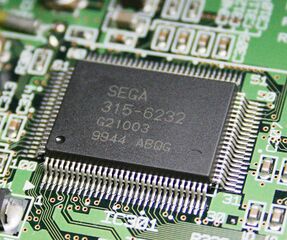Difference between revisions of "Yamaha Super Intelligent Sound Processor"
From Sega Retro
(Created page with "The '''Yamaha AICA Super Intelligent Sound Processor''' is a Yamaha sound processor released for the Sega Dreamcast console and Sega NAOMI arcade system in 199...") |
Bonus Game (talk | contribs) |
||
| (8 intermediate revisions by 3 users not shown) | |||
| Line 1: | Line 1: | ||
| − | The '''Yamaha AICA Super Intelligent Sound Processor''' is a [[Yamaha]] sound processor | + | {{cleanup}} |
| + | {{ICBob | ||
| + | | image=YAICASISP.jpg | ||
| + | | title= | ||
| + | | designer=[[Yamaha]] | ||
| + | | date=1998 | ||
| + | }} | ||
| + | The '''Yamaha AICA Super Intelligent Sound Processor''' is a [[Yamaha]] sound processor created for the [[Sega Dreamcast]] in 1998, and also used in the [[Sega NAOMI]], [[Sega NAOMI 2]], [[Sega Hikaru]] and the [[Atomiswave]]. | ||
| − | == | + | The '''AICA''' has similar specifications to the [[Saturn Custom Sound Processor]], albeit with a few differences, such as having twice the number of audio channels; no FM mode, and no EGHOLD; adding support to ADPCM; and a slightly more capable DSP. |
| − | *AICA clock rate: 67 MHz {{ref|http://web.archive.org/web/20000823204755/computer.org/micro/articles/dreamcast_2.htm}} | + | |
| − | *CPU core: ARM7 @ 45 MHz {{ref|http://www.segatech.com/technical/saturnspecs/}} | + | ==Technical specifications== |
| − | + | *AICA clock rate: 67 MHz{{ref|http://web.archive.org/web/20000823204755/computer.org/micro/articles/dreamcast_2.htm}} | |
| − | *[[Pulse-code modulation|PCM]]: 64 simultaneous audio channels, 16‑bit depth, 48 kHz sampling rate {{fileref|DreamcastDevBoxSystemArchitecture.pdf}}{{ref|http://segatech.com/technical/overview/index.html}} | + | *CPU core: ARM7 @ 45 MHz{{ref|http://www.segatech.com/technical/saturnspecs/}} |
| − | + | :*Performance: 32‑bit RISC instructions @ 40 MIPS (million instructions per second) | |
| + | *[[Pulse-code modulation|PCM]]: 64 simultaneous audio channels, 16‑bit depth, 48 kHz sampling rate{{fileref|DreamcastDevBoxSystemArchitecture.pdf}}{{ref|http://segatech.com/technical/overview/index.html}} | ||
| + | :*Hardware ADPCM 4:1 decompression | ||
*XG MIDI support | *XG MIDI support | ||
*3D environment effects | *3D environment effects | ||
*DSP for reverb, chorus and other musical effects | *DSP for reverb, chorus and other musical effects | ||
*[[RAM]]: 2 [[Byte|MB]] (Dreamcast), 8 MB (NAOMI) | *[[RAM]]: 2 [[Byte|MB]] (Dreamcast), 8 MB (NAOMI) | ||
| − | *Middleware: Audio compression, voice recognition {{ref|http://web.archive.org/web/20000823204755/computer.org/micro/articles/dreamcast_2.htm}} | + | *Middleware: Audio compression, voice recognition{{ref|http://web.archive.org/web/20000823204755/computer.org/micro/articles/dreamcast_2.htm}} |
| − | + | ==References== | |
| + | <references/> | ||
Latest revision as of 16:27, 25 May 2024
| This article needs cleanup. This article needs to be edited to conform to a higher standard of article quality. After the article has been cleaned up, you may remove this message. For help, see the How to Edit a Page article. |

|
| Yamaha Super Intelligent Sound Processor |
|---|
| Designer: Yamaha |
| Introduction date: 1998 |
The Yamaha AICA Super Intelligent Sound Processor is a Yamaha sound processor created for the Sega Dreamcast in 1998, and also used in the Sega NAOMI, Sega NAOMI 2, Sega Hikaru and the Atomiswave.
The AICA has similar specifications to the Saturn Custom Sound Processor, albeit with a few differences, such as having twice the number of audio channels; no FM mode, and no EGHOLD; adding support to ADPCM; and a slightly more capable DSP.
Technical specifications
- Performance: 32‑bit RISC instructions @ 40 MIPS (million instructions per second)
- Hardware ADPCM 4:1 decompression
- XG MIDI support
- 3D environment effects
- DSP for reverb, chorus and other musical effects
- RAM: 2 MB (Dreamcast), 8 MB (NAOMI)
- Middleware: Audio compression, voice recognition[1]
References
- ↑ 1.0 1.1 htt (Wayback Machine: 2000-08-23 20:47)
- ↑ http://www.segatech.com/technical/saturnspecs/
- ↑ File:DreamcastDevBoxSystemArchitecture.pdf
- ↑ http://segatech.com/technical/overview/index.html